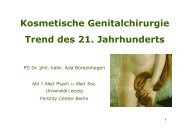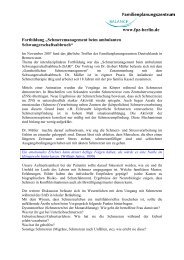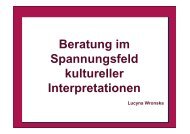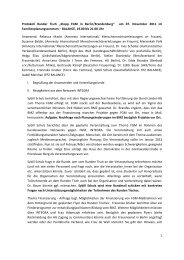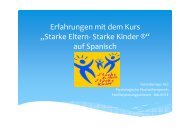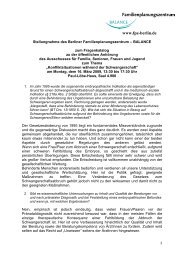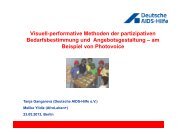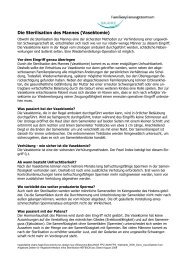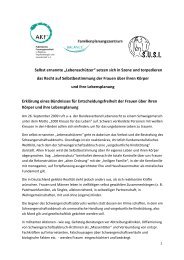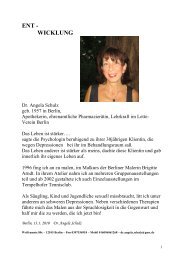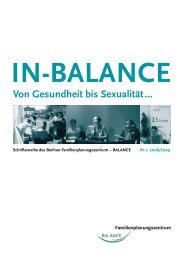Listening to African Voices - FPZ
Listening to African Voices - FPZ
Listening to African Voices - FPZ
You also want an ePaper? Increase the reach of your titles
YUMPU automatically turns print PDFs into web optimized ePapers that Google loves.
5.5.6. Cote d’Ivoire5.5.6.1. Socio-demographic profileThe Ivorian community is the sixth largest immigrant communityfrom Sub-Saharan Africa in Hamburg. There are 250men and 153 women adding up <strong>to</strong> a <strong>to</strong>tal of 403 (registered)Ivorian immigrants. We managed <strong>to</strong> interview a significantproportion of 92 men (37% out of the registered population),but were less successful in reaching the women withwhom only 18 interviews were completed. One reason forthe small number of interviewed women was that the interviewersfound it challenging <strong>to</strong> ask the spouse of Muslimwomen for an authorisation <strong>to</strong> interview their wives on the<strong>to</strong>pic of FGM/C. Another reason was that the women weremuch less likely <strong>to</strong> be found in places of public gathering. Inaddition <strong>to</strong> that, both researchers of Ivorian origin were menand they found it more difficult <strong>to</strong> approach women.5.5.6.2. Proportion of immigrant population concernedAbout 42% of the women in Cote d’Ivoire are estimated<strong>to</strong> have undergone FGM/C. The practice is particularlywidespread in the North West (85%), North (88%), CentralNorth (64%) and the Western region (64%). The prevalenceis higher among Muslims (76%) than among different Christianaffiliations (13-15%) and believers of traditional religions(45%) (INS, Ministere de lutte contre le SIDA & ORC Macro2006).About half of the interviewed participants originally comefrom one of the Northern regions where FGM/C is highlyprevalent. Further 12 participants are from the Western region.The remaining participants are from Southern regions(mainly Abidjan), the Central region and the Eastern region.Table 30: Socio-demographic characteristics of immigrants from Cote d’IvoireSocio-demographicvariableswomen(n = 18)men(n = 92)<strong>to</strong>tal sample(n = 110)Age (in years)Mean (standard deviation) 32.6 (5.3) 35.3 (6.3) 34.8 (6.2)Range 24-42 18-50 18-50Average education level (in years)Mean (standard deviation) 9.9 (5.0) 12.3 (5.0) 11.9 (5.0)Range 3-19 0-25 0-25ReligionMuslim 11 (61.1%) 66 (72.5%) 77 (70.6%)Christian 6 (33.3%) 17 (18.7%) 23 (21.1%)Traditional religion 0 (0.0%) 2 (2.2%) 2 (1.8%)None believers 1 (5.6%) 6 (6.6%) 7 (6.4%)Social statusMarried (monogamous) 11 (61.1%) 26 (28.6%) 37 (33.9%)Married (polygamous) 0 (0.0%) 2 (2.2%) 2 (1.8%)Separated/divorced/widowed 1 (5.6%) 14 (15.2%) 15 (13.8%)Never been married 22 6 (33.3%) 49 (53.8%) 55 (50.4%)Migrated from a(n)Urban area 15 (83.3%) 81 (90%) 96 (88.9%)Rural area 3 (16.7%) 9 (10%) 12 (11.1%)Residence statusUnbefristet (indefinite residence permission) 2 (11.1%) 31 (34.4%) 33 (30.6%)Befristet (temporary residence permission) 11 (61.1%) 29 (32.2%) 40 (37.0%)Duldung (<strong>to</strong>leration) 1 (5.6%) 11 (12.2%) 13 (12.0%)Others/no papers/does not answer 2 (11.1%) 13 (14.4%) 15 (13.9%)German nationality 1 (5.6%) 6 (6.7%) 7 (6.5%)Time spent in Germany (in months)Mean (standard deviation) 95.9 (52.7) 129.1 (63.3) 123.6 (62.7)Range 1-192 10-264 1-264<strong>Listening</strong> <strong>to</strong> <strong>African</strong> <strong>Voices</strong> 59





